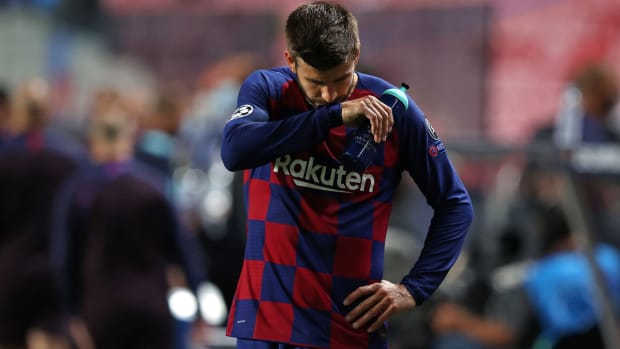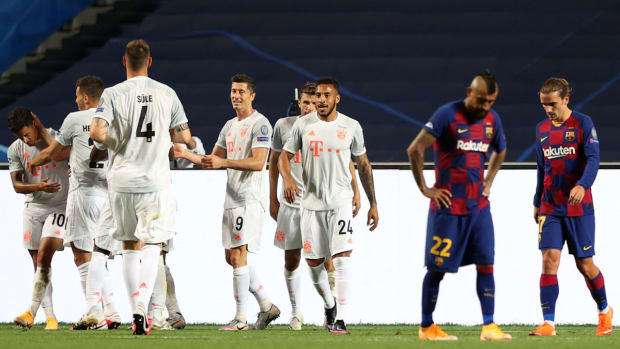Barcelona has been embarrassed on the Champions League stage in recent years, but never like this. An 8-2 thrashing for the ages calls into question all of the club's maneuvers that led to this point and will bring about a whole series of difficult questions regarding the future.
Briefly, it was very exciting. Then it just became embarrassing. Every year, as it's become for Barcelona, it’s the same problem. Every year, as soon as it meets a good side in the Champions League, it capitulates. It happened in 2017 against Paris Saint-German and then, after a bewildering comeback, Juventus. It happened in 2018 against Roma. It happened in 2019 against Liverpool. And it happened this year, worse than ever before, against Bayern Munich.
With the ball, in forward areas, Barcelona remains dangerous. Without it, it is a disaster. The aging midfield, even when bolstered by the addition of Arturo Vidal or Antoine Griezmann, cannot deal with anybody who runs at it, and the defense is frequently left exposed. It’s a problem of personnel, a problem of leadership and, most intractable of all, a problem of Lionel Messi. He remains a brilliant player. He frequently is Barcelona’s only hope. But he cannot press as he did a decade ago, and with Luis Suarez also essentially a static presence, that places an impossible burden on a midfield that is still expected to play the old way.
Quique Setien, almost certainly, will lose his job in the wake of Friday's 8-2 defeat to Bayern in the Champions League quarterfinals. He has looked hopelessly out of his depth since replacing Ernesto Valverde, but the suspicion is that most managers would, particularly if they were so obviously a third choice (at best). The identity of the manager is a problem, but it is nothing like the biggest problem. This is a club in desperate need of a major reset. Gerard Pique openly admitted as much in his heartfelt, emotional postgame comments. There will be talk of a philosophy gone stale, and it may be that it needs to evolve, but at least as big a problem is a staggeringly wasteful transfer policy that means the key players are still the old ones.

Of the hopeless recruitment there could be no greater symbol than Philippe Coutinho, a $190 million signing for Barcelona, coming off the bench for Bayern–to whom he was loaned to ease Barcelona’s wage outlay–only to assist on one goal and score the final two.
But Bayern, brilliant as it was going forward, was far from secure at the back. It played an extraordinarily high line, as though in tribute to the high line Pep Guardiola had played against Barcelona in the 2015 semifinal first leg in which Bayern was beaten 3-0. Repeatedly early on, Barcelona got in behind the back four and, although it was 4-1 down after 31 minutes, it could easily have been 3-1 up after 15.
The opener, scored after four minutes, was a mix of Barcelona fallibility and Bayern brilliance. Ivan Perisic found a baffling amount of space behind the Barcelona defense and crossed to the top of the box for Thomas Muller, who knocked it down for Robert Lewandowski, took the return pass and cuffed the ball into the bottom corner. It was the 18th goal for which the Polish striker had a direct involvement in the Champions League this season.
What followed was preposterous, the reductio ad absurdum of the superclub decadence. What you couldn’t help but wonder, if somebody, somewhere, reinvented defending? Both sides looked vulnerable, but Bayern was stronger and quicker. There were 17 shots in the first half, only three of them for Barcelona. Of Bayern’s shots, 13 came in a 26-minute period that in the way it pitted a hapless, punch-drunk defense against a rampant attack was reminiscent of Germany’s 7-1 victory over Brazil in the World Cup semifinal in 2014.
Barcelona’s early equalizer was freakish, with David Alaba scooping over his own keeper for a seventh-minute own goal, but that was just the first of three great chances Barcelona had in the opening 10 minutes. On the last of them, Sergio Busquets failed to get a touch on a Lionel Messi cross, and the ball drifted on to hit the post. It’s a fragility that will encourage whoever wins Saturday’s quarterfinal between Manchester City and Lyon.
But the momentum tipped rapidly. Perisic made it 2-1 with a crisp drive. Serge Gnabry got the third after a brilliant flick over the top from Leon Goretzka. Muller darted across the near post to get the fourth 31 minutes in.

That really should have been game over, but Suarez ripped by Jerome Boateng–not the first time he’s been made to look lumbering by a Barcelona forward–to cut the deficit to two. But Barcelona’s defending isn’t good enough to provide the platform for a comeback. Alphonso Davies beat Nelson Semedo with a moment of mesmerizing skill and was then weirdly allowed to advance into the box unchallenged to cross for Joshua Kimmich to make it 5-2. Coutinho crossed for Lewandowski to make it six and then scored the seventh and eighth himself.
But by then the numbers barely mattered. For the record, it was the first time Barcelona had conceded eight in a game since losing 8-0 to Sevilla in the 1946 Copa del Rey. But this was about more than records. This was an epic humiliation, one that has been coming for three or four years now–and one that surely will provoke a complete and long overdue overhaul.